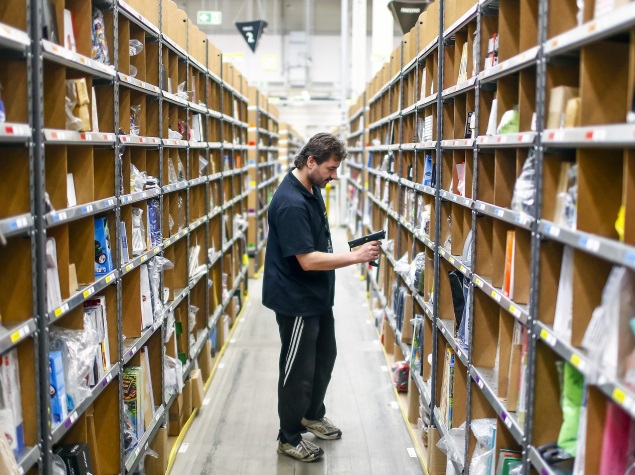- Home
- Internet
- Internet News
- Europe's Postal Firms Under Fire as Amazon Expands Deliveries
Europe's Postal Firms Under Fire as Amazon Expands Deliveries

Companies such as Deutsche Post, whose DHL arm already offers a range of services including help with local duties and red tape on international deliveries, are best placed to cope, according to analysts.
Those such as Britain's Royal Mail and Belgium's Bpost that are more focused on parcels and local markets, however, have much more to do, they added.
Online shopping was supposed to be the big growth driver for postal firms in an age of instant communication.
But shares in newly-privatised Royal Mail slumped 13 percent in two weeks after it warned last month that Amazon's bid to capture a bigger slice of deliveries would cut its revenue growth prospects by at least half.
Amazon has roped in newspaper and magazine distribution firm Connect for a new same-day parcel service in Britain ahead of the busy Christmas season. The so-called "click and collect" service -- where parcels are delivered to a pick up point rather than to a customer's door -- follows the launch of Amazon's own delivery service last year.
What's more, analysts expect Amazon, and potentially others too, to start rolling out similar services across Europe's 30 billion euros-a-year parcels and express delivery market, leading many investors to flee traditional postal firms.
Shares in PostNL, TNT Express and UK Mail as well as Royal Mail have fallen 20-30 percent this year. Edmund Shing, global equity fund manager at BCS Asset Management, says such firms have their work cut out.
"Before becoming positive on the sector, I would like to see them making efforts to improve productivity, adopt technologies like softwares to optimise logistics networks, cut labour costs and have a sustainable dividend policy," he told Reuters.
"It's a very competitive market, growth prospects are limited and the barrier to entry is not very high. The danger for the market is that Amazon might replicate its experiment across Europe and other online companies such as eBay also launch their own delivery services to cut costs."
Delivering change
Analysts said meeting the challenge could be painful for traditional postal firms, many of which have already slashed jobs to cope with the decline of letter deliveries and have unionised staff likely to resist more lay-offs.
But some are better placed than others.
Kepler Cheuvreux analyst Andre Mulder said those included more diversified firms, such as Deutsche Post and TNT Express, which have strong international freight businesses.
"TNT Express has got the biggest earnings growth potential due to cost savings," he added, noting that TNT is aiming to cut its warehouse capacity without compromising on efficiency by rolling out new technologies, such as specialised software.
Deutsche Post, meanwhile, offers a variety of services through its DHL logistics arm, including express courier, forwarding and supply-chain services that go beyond basic package delivery.
This appears to be bearing fruit.
Juergen Gerdes, chief executive of Post-eCommerce-Parcel at Deutsche Post DHL, told Reuters its parcel business was developing "unbelievably and dynamically and we have only touched the tip of the potential that the future will bring."
Earlier this year, the firm said it might even re-enter markets it had exited such as France or Britain.
Investors have rewarded Deutsche Post with a higher valuation than many peers. Its stock trades at 14.2 times forecast earnings against 12.3 times for Royal Mail, according to Reuters data.
Other postal firms say they are also fighting back.
UK Mail, for example, is investing in a new fully-automated central hub near Coventry, central England, to increase sorting capacity and cut costs.
Bpost is increasing delivery options for customers, including installing parcels lockers in Belgium, while PostNL's Whistl business is trialling electric "AirWheel" unicycles to speed up delivery in urban areas.
Some investors, however, want to see signs that such strategies are working before putting their money back into postal stocks.
"I participated in Royal Mail's IPO, but took profits shortly afterwards," John Smith, senior fund manager at Brown Shipley, said.
"I would like to see quality management, sustainable dividend payouts and strong growth potential before returning to the sector."
© Thomson Reuters 2014
For the latest tech news and reviews, follow Gadgets 360 on X, Facebook, WhatsApp, Threads and Google News. For the latest videos on gadgets and tech, subscribe to our YouTube channel. If you want to know everything about top influencers, follow our in-house Who'sThat360 on Instagram and YouTube.
Related Stories
- Amazon Great Indian Festival 2024
- Big Billion Days 2024
- Apple Vision Pro
- Oneplus 12
- iPhone 14
- Apple iPhone 15
- OnePlus Nord CE 3 Lite 5G
- iPhone 13
- Xiaomi 14 Pro
- Oppo Find N3
- Tecno Spark Go (2023)
- Realme V30
- Best Phones Under 25000
- Samsung Galaxy S24 Series
- Cryptocurrency
- iQoo 12
- Samsung Galaxy S24 Ultra
- Giottus
- Samsung Galaxy Z Flip 5
- Apple 'Scary Fast'
- Housefull 5
- GoPro Hero 12 Black Review
- Invincible Season 2
- JioGlass
- HD Ready TV
- Laptop Under 50000
- Smartwatch Under 10000
- Latest Mobile Phones
- Compare Phones
- Vivo Y300 5G
- Red Magic 10 Pro+
- Red Magic 10 Pro
- Asus ROG Phone 9
- Asus ROG Phone 9 Pro
- ZTE Blade V70
- Vivo Y18t
- Honor X9c
- Asus Zenbook S 14
- MacBook Pro 16-inch (M4 Max, 2024)
- Huawei MatePad 11.5
- Acer Iconia Tab 10.36 (iM10-22)
- Redmi Band 3
- Xiaomi Smart Band 9 Pro
- Sony 65 Inches Ultra HD (4K) LED Smart TV (KD-65X74L)
- TCL 55 Inches Ultra HD (4K) LED Smart TV (55C61B)
- Sony PlayStation 5 Pro
- Sony PlayStation 5 Slim Digital Edition
- Carrier 2.0 Ton 5 Star Inverter Split AC (24K EMPERIA LXI INV)
- Lloyd 2 Ton 3 Star Inverter Split AC (GLS24I36WGVR)

















